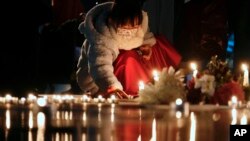Even moderate political discussions now appear to be out of bounds in Hong Kong, lamented Rowena He, an associate professor at The Chinese University of Hong Kong (CUHK) who was fired after she was denied a renewal of her work visa.
The Hong Kong Immigration Department on October 24 told He, a Chinese Canadian scholar and historian, that it had denied her work visa renewal application. Without it, He, who is in the United States on an academic fellowship, can't return to Hong Kong.
"I'm not only sad for myself but also for Hong Kong, as its freedom of speech and society cannot tolerate even moderate discussions," He said in an interview with VOA's Mandarin Service.
She said CUHK, where she had worked since 2019, sent her a letter saying that her position had been "terminated with immediate effect." The CUHK website says, "Prof. HE Xiaoqing Rowena is currently on leave."
Asked this week about He's rejection, Hong Kong Chief Executive John Lee said the Immigration Department handles cases in accordance with established policies.
"When the government approves work visas, the Immigration Department always handles them in accordance with current policies and principles, including checking whether the applicants hold valid travel documents, whether they pose a burden to Hong Kong, and whether they will cause security and criminal risks."
He, who specializes in modern and contemporary Chinese society and politics, wrote a 2014 book, Tiananmen Exiles: Voices of the Struggle for Democracy in China.
Created seminars about Tiananmen Movement
The bloody crackdown on Tiananmen Square protesters on June 4, 1989, remains a politically sensitive topic for the Chinese government.
He has had an outstanding academic career, having taught previously in the U.S. at Saint Michael's College, Wellesley College, and Harvard University. At Harvard, she received the prestigious Certificate of Teaching Excellence for three consecutive years for the seminars that she created on the 1989 Tiananmen Movement and its aftermath.
She also received outstanding teaching awards at CUHK in 2020 and 2021 and is a 2022-2023 Luce Asia Fellow with the National Humanities Center in Research Triangle Park, North Carolina.
He said CUHK supported her participation in the program of academic research when she applied. On the fellowship, she is working on "Evening Chats in Hong Kong" a major part of her manuscript in progress, Memory as Resistance: from Tiananmen to Hong Kong. The CUHK site described the book as focused on "historical memory and power, and their implications for youth values, identity, and citizenship."
The professor told VOA Mandarin that the Immigration Department had inquired about her past work at other universities, her relationships with other nonprofit organizations, and the funding sources of some organizations. The Immigration Department did not disclose why it rejected her application.
She said that her two previous visa applications to Hong Kong in 2019 and 2021 were quickly approved. She applied for renewal in July last year before leaving Hong Kong for the fellowship, but her application was delayed for more than a year before being rejected.
She said she has no plans to return to Hong Kong with other types of visas for the time being.
"I grew up in China. Now, I see Hong Kong becoming like this," she said in a telephone interview from the U.S. this week. "This sadness is not just my own, but Hong Kong's. It is a sadness for these times we live in."
'I was just teaching history'
He said although she felt pressure from her department to watch what she said, she never censored herself when teaching at CUHK.
"I told my students that I wanted to guard the freedom of academic discussion in our classroom or between us and because I didn't express anything in an extreme way," she said. "I was just teaching history, so I didn't think I needed to censor anything.
"I also thought it was irresponsible for my students. The school didn't pressure me, but I felt pressured in the immediate work environment, which is the department."
She is worried that the Hong Kong government's decision will affect other Chinese scholars studying or working overseas.
"Every time they make an example, it will definitely affect everyone psychologically and emotionally," she said.
"Everyone will ask the question: If I can't get a visa like her next time, will no one help me? … On the other hand, of course, I hope that people will not give up because of this. On the contrary, we must guard these most basic academic freedoms instead of giving them up at times like this."




